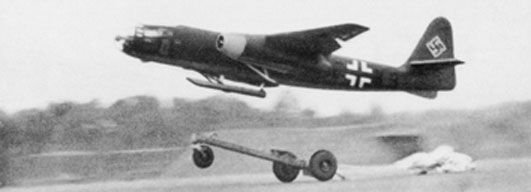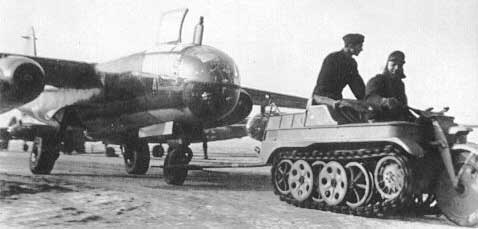
The Ar234 prototype making it's first landing

Engine: 4x BMW 003 A-1 turbojet engines making 800kg of thrust each.
Wing Span: 14.44 m

|
Conceived in response to a Air Ministry requirement for a fast reconnaissance aircraft in 1941. Arado was issued a contract for six prototypes of there E 370 in April 1942, with a further fourteen aircraft in December 1942. The Arado E370 was to be powered by two Junkers Jumo 004 turbojet engines, have a range of 2,000 km and a top speed of 780 km/h. To achieve this Arado proposed the aircraft would not have a conventional undercarriage, but take off using a three wheeled trolley and land by means of skids, so to making room in the fuselage for the fuel which would be needed. |
| The V1 prototype was finished after fifteen months, but engine development at Junkers was falling behind and the flight qualified engines would not ready until mid 1943. When they were the Arado Ar 234 V1 did not disappoint with it's first flight on the 30/7/1943. In the mean time the Luftwaffe had given some thought to using the Arado as a bomber, with two prototypes being ordered, known as the Ar 234B, this change of use meant that a number of changes in the design were required, the most obvious being the replacement of the landing system to a tricycle undercarriage and three external racks for bombs. This aircraft the V9 made it's first flight on the 12/3/1944. |

|

|
At around the same time two Ar 234 prototypes V5 and V7 were sent to the Luftwaffe reconnaissance unit Ob.d.L.1 to evaluate the aircraft in the field, the first operational flight being on the 2/8/1944 with flights over the Allied beachhead in Normandy. It had all ways been hoped to find a better engine set up for the Arado 234 from the beginning and prototypes V6 and V8 were used to test the BMW 003 turbojet engine, which because it didn't make so much power as the Junkers engine was fitted two to a wing (separately for the V6 and in pairs for the V8). This work led in time to the Ar 234C which was to be the definitive production model |
| The AR 234C had a number of improvements a better pressurized cockpit, larger wheels, two 20mm cannons (firing to the rear) it was intended to make a number of versions of this aircraft Reconnaissance, Bomber, Ground Attack, Night Fighter and Formation Command, altogether only 19 production Ar 234C's (as well as thirteen C model prototypes V19-V31) were made out of the order for 2,500 aircraft along with around 200 of the Ar 234B. A number of new wing and cockpit designs were ready to be tested by the wars end, the V16 with variably swepted wings and the V30 with a two man cockpit. |
|
|
The Mockup of the C-5 two man cockpit
|